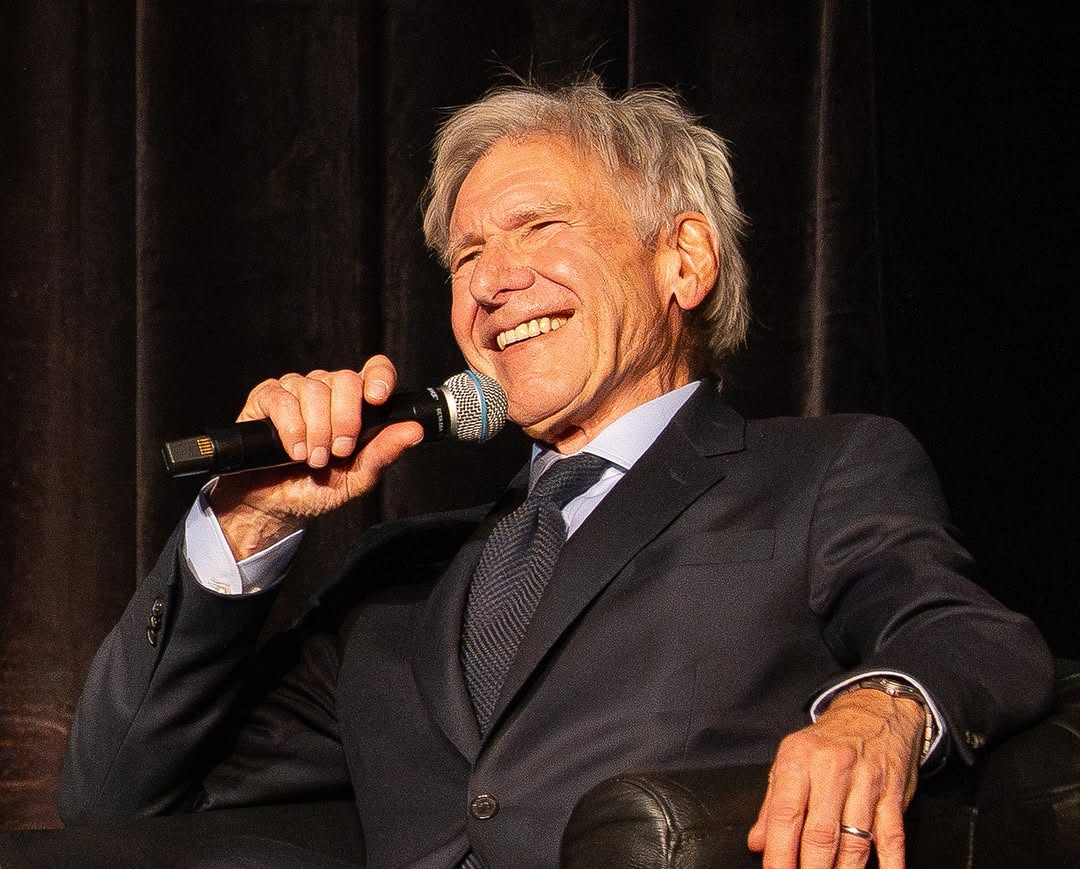In 2025, Harrison Ford surprised audiences with a red‑carpet cameo at Train Dreams while delivering a scathing critique of Donald Trump’s climate policies, highlighting how his dual roles in entertainment and environmental activism carry significant financial, legal, and reputational implications for studios and stakeholders.
Harrison Ford’s Surprise Premiere Appearance & Climate Critique Shake Hollywood
Harrison Ford, 83, dominated headlines this week with two highly public moments: a surprise appearance at the Los Angeles premiere of Train Dreamsstarring Joel Edgerton and Felicity Jones, and a blistering interview in which he condemned former President Donald Trump’s environmental record.
The premiere cameo delighted fans and social media alike, reaffirming Ford’s enduring draw as a marquee name in Hollywood. Yet in a separate, far more serious statement, Ford did not hold back in The Guardiancalling Trump’s climate policies “among the worst crimes in history” and warning:
“It scares the shit out of me. The ignorance, the hubris, the lies, the perfidy. He knows better, but he’s making money, hand over fist, while the world goes to hell in a hand‑basket.”
(theguardian.com)
Ford, vice‑chair of Conservation International, has long combined his status as a leading actor with environmental activism. His comments underscore the power and responsibility that high-profile talent can exert, but they also raise practical concerns for studios, financiers, and investors navigating the intersection of celebrity influence and corporate risk.
Harrison Ford
Why CEOs, Studios, and Investors Should Take Note
While celebrity commentary can seem peripheral, Ford’s dual actions carry direct business, legal, and financial implications:
1. Brand and Talent Risk
Ford’s red‑carpet cameo adds measurable publicity value, boosting ticket sales, streaming interest, and licensing potential. At the same time, his public activism introduces reputational complexity. Companies must now weigh association benefits against the risk of polarizing audience segments.
2. Financial Exposure and ESG Alignment
According to analysis reviewed by CEO Today, stars with public-purpose credibility influence not only ROI from box-office and streaming but also broader ESG-aligned investment and financing decisions. For instance, Ford’s climate activism could affect investor perception, insurance premiums, or marketing strategies if a film’s environmental impact is scrutinized.
3. Legal and Governance Considerations
While no litigation has arisen, public activism can create indirect contractual risk. Talent agreements increasingly include morality, reputational, and ESG clauses. Studios may face heightened regulatory or investor expectations for transparency and alignment with sustainability commitments.
4. Talent Management and Corporate Culture
Ford’s statements highlight how creative leadership, personal values, and corporate governance intersect. Boards of media companies and talent agencies may need to actively manage potential conflicts between celebrity activism and business objectives, ensuring talent relationships and production culture remain stable.
The Wider Context: Hollywood, Star Power, and Activism
Ford’s dual role exemplifies a growing trend in Hollywood: actors increasingly combine professional performance with social and environmental advocacy. While Method actors, surprise cameos, and headline-grabbing activism can amplify visibility, they also introduce measurable financial and governance considerations for studios, from production risk management to investor relations.
As media-law expert Prof. David Hesmondhalgh notes:
“High-profile talent today isn’t just an actor—they’re a brand. Every public stance carries measurable risk and opportunity for studios and investors alike.”
Ford’s critique also reflects broader cultural and financial pressure on Hollywood to respond to climate change, ESG expectations, and activist stakeholders. Failure to align can have both reputational and economic costs.
What Happens Next? Strategic Lessons for CEOs
-
Contracts and Clauses: Talent agreements should include clarity on activism, ESG alignment, and reputational management.
-
Marketing and PR Strategy: Surprise appearances and activist statements must be strategically managed to maximize brand benefit while mitigating backlash.
-
Production overview: Boards and investors may demand additional governance around projects with high-profile, activist-aligned talent.
-
Insurance and Financing: Insurers and financiers may flag films involving outspoken talent, requiring contingency funds and risk-adjusted financing.
Ford’s simultaneous red-carpet cameo and environmental critique serve as a reminder that celebrity influence now intersects directly with corporate, financial, and governance strategy. Boards, investors, and executives must recognize that talent decisions today are inseparable from risk management and ESG considerations.










